|
“Again Livingstone
set out on his weary way, untrodden by white man's foot before, to
pass through
unknown
tribes,
whose savage temper might give him his quietus at any turn of the road.
There were various routes
to the sea
open to him. He chose the route along the
Zambesi--though
the most difficult, and through hostile tribes--because it seemed the
most likely to answer his desire to find a commercial highway to the
coast. Not far to the east of Linyanti, he beheld for the first time
those wonderful falls of which he had only heard before, (the local
Bantu name was Mosi oa Tunya, meaning ‘the smoke that thunders’).*
Livingstone gave them an
English name,
-- the first he had ever given in all his African journeys, -- the
Victoria Falls.
This discovery was the one that took most hold on
the popular
imagination, for the Victoria Falls are like a second Niagara, but
grander and more astonishing; but except as illustrating his views of
the structure of
Africa,
and the distribution of its waters, it had not much influence, and led
to no very remarkable results. Right across the channel of the river was
a deep fissure only eighty feet wide, into which the whole volume of the
river, a thousand yards broad, tumbled to the depth of a hundred feet,
the fissure being continued in zigzag form for thirty miles, so that the
stream had to change its course from right to left and left to right,
and went through the hills boiling and roaring, sending up columns of
steam, formed by the compression of the water falling into its narrow
wedge-shaped receptacle.”
The Personal Life of
David Livingstone, William Garden Blaikie
I flew to Northern
Rhodesia in 1962 on a Boeing 707 jet that stopped at Rome, Benghazi
Libya, Brazzaville Congo, and Salisbury Southern Rhodesia. Before
departing London, I had tasted my first hamburger, and at Rome’s
Leonardo
da Vinci airport
I drank my first coca cola. (I haven’t cared much for either since). I
was sat beside a young man of my age who was going out to learn how to
manage a tobacco farm. I have often wondered since what became of him.
During the stop-over in Salisbury, a Scottish schools inspector,
Campbell Duthie, nephew of the MP referred to earlier, kindly showed me
around the city and gave a brief overview of the country and its
history. His wife had been a friend of Miss Boyne, the school-teacher I
referred to in the account of my primary school memories. Africa was
like that. Scots especially kept running into acquaintances or friends
of acquaintances. I was surprised that the Duthie’s had a log fire
burning in their large living room. In the UK we sometimes forget that
many parts of Africa can be cold or chilly at times. I was later to
encounter snow and sub-zero temperatures in Johannesburg and Windhoek.
At Lusaka airport I was
met by two fine men who worked then in the Northern Rhodesian Game and
Fisheries Department. Jim Soulsby, Fishery Officer South, was an
excellent technical officer, and was later head of a London company,
Fisheries Development Ltd. Colin Tait, a young South African of
Scottish parentage, was a Ranger on Lake Kariba. Colin was marvelous
company to have in the long dark nights in the bush, with his love of
jokes, and his fund of songs and stories. After a couple of days at the
Fisheries Offices in Chilanga, I headed down the valley with Colin.
Weather on the plateau was sunny and pleasant. The temperature rose and
the atmosphere got dustier as we drove down the 2,000 foot escarpment to
the Zambesi valley.
At Sinazongwe, now a
research station, the fishery training centre was nearing completion.
Dick Heath, a master boat-builder from Sussex was then in charge. The
centre had sheds for assembling nets, building boats and repairing
motors. There was a kitchen, a dormitory, and a few dozen staff houses.
A South African builder, Tommy Thompson had a team of semi-skilled
workers putting up the buildings. Concrete blocks were made on the spot,
and the corrugated tin roofs were supported by light pre-fabricated
steel frames.
The expatriate officers
had larger houses of the same construction, with either 2 or 3 bedrooms
and a screened verandah. They were originally built to accommodate the
operators of bush-clearing bulldozers who were hired to clear fishing
pitches in level areas covered by mopani trees, before the lake water
rose. One of the drivers was run over by his own bulldozer that jumped
unexpectedly into reverse. He was buried on the spot, and his grave
marked by a black wooden cross on a lump of concrete. I came upon it
one day in the bush behind my house when exploring the area, and
thought, “what a place to die; and what a lonely grave to have”.
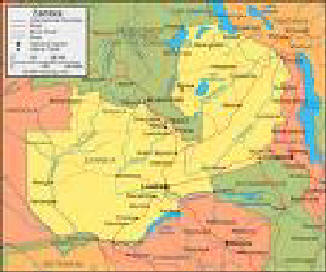
A 45 gallon oil drum
set long-ways on bricks above an outside fire box, served as a hot water
tank. It was filled by a hose, and had a pipe leading from its base
into the bathroom nearby. The houses also had air-conditioners of
sorts. These were metal boxes stuffed with straw, behind which a fan
blew air through the straw into the room. The same fan drove a small
pump that drew water from a tray below the straw, and let it trickle
back down from above. The resulting effect was not as poor as might
seem, although one got hit by drops of water, as well as experiencing a
slight fall in the room temperature. Water came from a station tank fed
by a borehole pump. This often broke down, especially towards the end
of the dry season. The station generator was stopped at 10pm each
evening, so one had electricity and light, only till then. On the
numerous evenings when the engine operator Cosam had a social
engagement, the generator and the electricity ceased functioning
earlier.
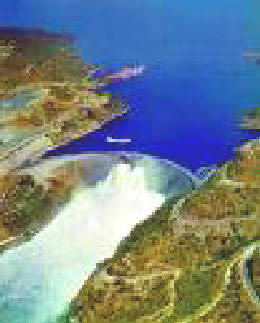
Kariba Dam
Kariba-generated
electricity never reached remote outposts like Sinazongwe. It was
conveyed by power cables, south to Salisbury (now Harare), and north to
Lusaka and the copperbelt towns of Kitwe, Ndola and Mufulira. The dam
had been proposed partly as a Federation project, - an enormous
investment in energy generation that would be seen as both a benefit and
a symbol of the Federation of Rhodesia and Nyasaland. As things
transpired, the much-vaunted central African federation disintegrated
within three years of the dam’s completion. Apart from the loss of
their ancestral homes from the formation of the lake, and the subsequent
development of a fishery in the lake waters, the dam had little other
effect on the valley Tonga peoples.
The Africans of the
Gwembe valley were mostly Ba-Tonga people. Father north, north-east and
north-west were Bemba, Lozi, Nyanja, Kaonde, Lunda and Luvale tribes.
The Batonga were then as a poor and as primitive a people as could be
found in the country. The women wore beads on their heads, arms and
tummies, and sometimes had sticks inserted through their ears and noses
for decoration. They also had their front teeth removed, or the older
generation did, for reasons which were obscure. The men invariably
carried an axe made of a club-like piece of mopani wood, with an iron
axe-head, pointed at the back, inserted through the stouter end. They
were a friendly, simple people, who enjoyed a joke, and who never failed
to greet passers by, which was done in a very respectful and
time-consuming manner.
So many times when driving through the bush, I was saluted by a Batonga gentleman
whose clothes were in rags, but who looked me
in the eye and proudly
gave his greeting, and expected a similar respectful salutation in
return. “Mwapona” (you are seen, or hullo), “mwapona Mwami”
(chief or sir), “mwapona kabotu” (it is good you are seen, -
or are you well), … and so on. Those poor people were all that I had
heard “bush” Africans could be. They were polite, sincere and honest.
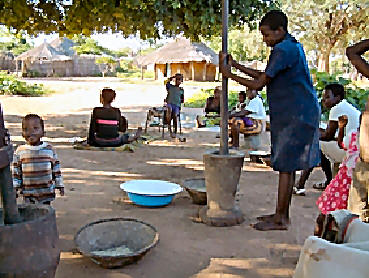
Batonga village
In three years in that
valley, no-one ever showed me the slightest hostility, and no-one stole
a thing from me (apart from the little bit of sugar, etc, that my cook
would take, but that was one of the perks of his job).
In his book, “The
Shadow of the Dam”, David Howarth describes the Gwembe people as
seen through the eyes of District Commissioners and District Officers of
the late 1950’s. “With the Tonga, nobody needed to be tough. Each
District Commissioner who took over the Gwembe Valley grew fond of the
Tonga, because they were charmingly cheerful and happy-go-lucky when
times were good, and courageous when times were bad, and because they
were courteous, kind and friendly but never servile; in short, because
on the whole they were lovable people.”
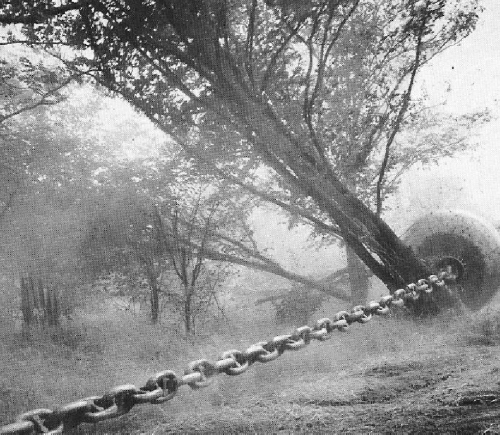
Bush clearing : large areas of Mopani
trees were cleared to make room for fishing grounds where nets could be
set without fear of entanglement. However that still left substantial
areas of flooded forest where fish could breed and grow protected from
both fishing nets and predator fish.
Naturally, I could
hardly wait to get my first sight of the lake, the boats and the fish.
There was a natural harbour and a concrete sloping pier 3 miles up the
lakeside from our station. An ice plant had been erected there by a
South African firm, and was operated by a cheerful Johnny Young. Fish
traders came down from the copperbelt towns in a motley assortment of
trucks and half-trucks. They packed the fish they purchased (at 4 old
pence per pound), in the ice, with straw for insulation. The fishing
boats themselves landed at a number of places along the lake side, and
the traders would drive to one of these spots after purchasing his ice.
Invariably at the landing site there would be weighing-scales operated
by a fishguard in a boy-scout like uniform, with two other fishguards
noting the amounts and the species in pre-printed log books, in
compliance with the Colonial fixation for recording everything.
There were four boat
types in operation, - dug-out canoes as used before on the river Zambesi,
flat bottomed planked boats of local construction, and clinker-built
‘banana’ boats built at our centre on the lines of the Irish curragh.
The fourth type were metal boats built by a fabrication yard in Lusaka
to specifications determined by an ex-naval District Officer. They
looked like matchboxes with a pointed end! The dug-out canoes were
suitable for use on calm days only. The flat-bottomed canoe was also
more suited to river conditions. The curragh-based ‘banana’- boat canoe
was excellent in all respects, - it was seaworthy, manoeuvrable, had
good capacity, and could be either paddled with ease, or power-driven.
Of the ‘metal-box’ boat, - the less said the better. It was so unsafe,
it had buoyancy tanks welded in fore and aft, and these left little
room for men, nets or fish. Also the bottoms rusted through within a
year, which annoyed the owners who had purchased them on a 3-year loan.
But such monstrosities were often inflicted on native populations by
Colonial rulers. I used to think the rondarvel ‘tin’ huts were a
similar disgrace. They had been designed as a fast and easy answer to
native housing, and could be assembled quickly from galvanized metal
sheets. In shape they resembled native pole-and-mud huts, but that was
the only concession to traditional design. They made excellent solar
ovens, but as human dwellings, they were an abomination.
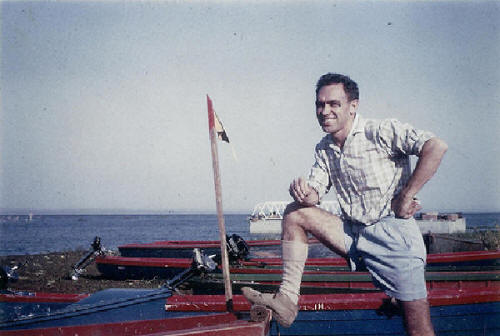
Myself surveying our little fleet on the
lake
The lake itself was filling up and nearing its highest point
when I arrived. I believe that point was attained during the November –
February rainy season which was just 3 months away. Most days the water
was fairly calm, but a regular breeze came up the valley from the Kariba
gorge to the Victoria falls, and at times it made the exposed parts of
the lake quite rough, with short choppy seas that would have presented
no problem to marine vessels, but which could make conditions
uncomfortable for the small open boats in use on Kariba. At times the
breeze could create small whirlwinds and waterspouts.
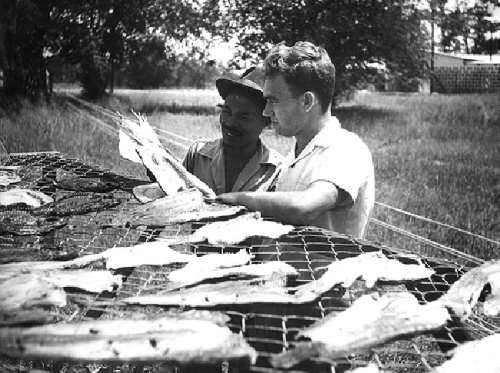
With a copperbelt trader, examining dry
fish
The range of fish
species was intriguing. I had no idea tropical freshwater fish came in
so many different shapes and sizes. There were mud-sucking labeos,
slimy catfish, razor-toothed tiger fish, huge tilapia bream, spiny
synodontus and long-nosed myropsis, as well as numerous smaller
species. Later, the Lake Tanganyika sardine, “kapenta” or
”ndaaga” (Limnothrissa) were introduced to Kariba, and quickly
filled an environmental niche in the deeper parts of the lake, and
became the basis of a large light-attraction fishery. But that was just
after my time there, though the matter was then under consideration.
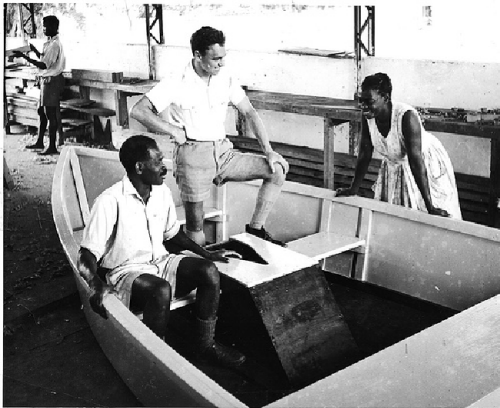
Above :
Handing over a new boat to local
fisherman Gray Madyenkuku and his wife

Kapenta fish, limnothrissa, the
small anchovy-like species introduced from Lake Tanganyika to the
benefit of Kariba fishers. On the right, tiger fish, hydrocyon
vitattus, the fierce game fish in lake Kariba
Of wild-life there was plenty then, though my first
impression of the bush was that it was devoid of life apart from ants
and termites, lizards, flies and hornets. The rising lake had moved
animals up from the valley, and for a while the shore was replete with
animals, mainly snakes, but also
monitor
lizards, chameleons, baboons, warthogs, small antelope, kudu
and elephant. There had been an “operation Noah” mounted to rescue some
of the animals from the rising waters, and a film was made of those
activities. In my time there, in addition to those mentioned above, I
encountered hyenas, wild dogs, hippopotamus, crocodile, aardvark
ant-eaters, bush babies, civet cats and genet cats, and one
leopard. There were hardly any lion in the valley.
It was the snakes I
disliked. My first year there, I think I saw one every day. There were
large pythons, boemslangs, sand snakes, spitting cobras and puff-adders,
long mambas, and smaller tree snakes and grass snakes. One of my cats
was spat on in the eyes by a cobra, but survived, and my dog died from
snake bite after I had left. Today I see naturalists on television
handling such snakes with seeming ease. I never had any inclination to
get close to them. Below are examples of the wild life I saw regularly
in the valley: elephant, hippo, wild dog, kuu, baboon, monitor lizards,
and a mamba snake – I saw a great of variety of snakes around the lake,
encountering them every week if not every day.
Bottom – a large monitor lizard, common
in the Zambesi valley and sometimes mistaken for crocodiles.
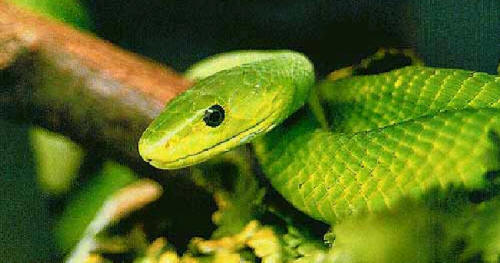
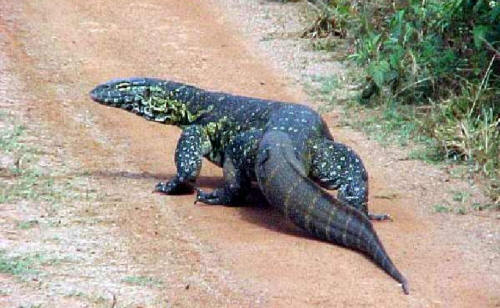
Below :
Elephants and hippos in Lake Kariba and Babboon and wild dogs were
abundant in the valley
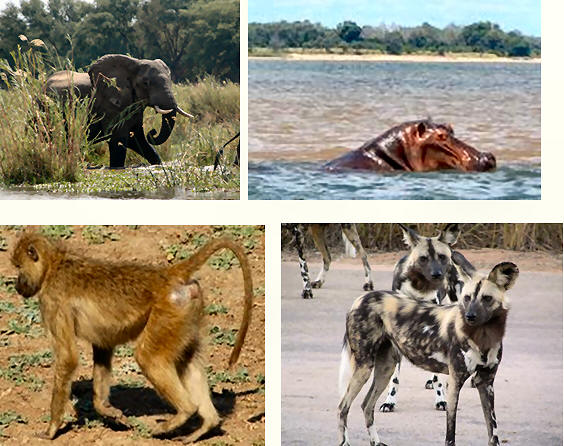
Mosquitoes came out in
force every night, and it was next to impossible to avoid getting bitten
regularly. I took my daily chloroquin pill, and never succumbed to
malaria or to denghi fever. Apart from mosquitoes, there were tiny lake
flies that hatched out and appeared in hordes for a few days. They were
so small they went through the mosquito screens with ease, so it was
“lights out” on those nights. The infection my colleagues feared more
was bilharzia, or schistosomiosis, from a parasite that
moved from water snails to humans and animals, and could kill if not
treated. I escaped that infection also, but fell foul of amoeba, and
had at least one bout of amoebic dysentery. The single cell parasites
were to remain lodged in my system for 15 years by which time they had
developed abscesses in my liver. By 1977 – 78 I was weak and
debilitated but no doctor could diagnose the problem till I underwent a
liver scan in the Makati Medical Centre in Manila. When they detected
the abscesses, they cheerfully informed me I had about three months to
live if they were not eliminated from my system. A cocktail of drugs
was prescribed and within a few weeks they were gone. I was then very
thin, but 2 years after the cure I put on weight and have not been able
to lose it since.
My first bout of
amoebic dysentery occurred in a remote village in the upper Gwembe
valley where I and a colleague Peter Cocker, were both afflicted
suddenly one night after eating local food. We took turns to use the
temporary ‘PK’ (pikaniny kayak, or ‘little house’) down the path
from our camp. At the the first light of dawn a line of local women
came by heading towards the river with their water drums on their
heads. Poor Peter was unable to wait for me coming out of the bush
toilet, and he had squatted down by the side of the path. I could not
help laughing through my discomfort as I heard him exclaim to the
passing women, “I’m sorry ladies, - but I just can’t help it” !
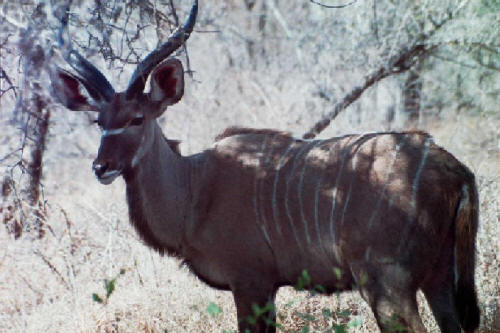
A magnificent kudu antelope. They were
plentiful in the valley when I was there.
It
was not long before I had the opportunity to visit the magnificent
Victoria Falls near the town of Livingstone. Later I was to travel
north to the huge inland sea of Lake Tanganyika, and north-west to Mweru
and Bangwelu lakes. I sailed over lake Mweru with the local fishery
officer Dermott Beattie, who hailed from Northern Ireland, and visited
the Katanga part of the Congo. That was when Moise Tshombe was still in
charge, but when the UN troops were advancing to destroy the secession.
We visited a local Catholic mission, hospital and a fishery school where
the houses were painted like ships and named after French vessels like
the Lusitania. The students wore sailor uniforms and spoke both
Bemba and French. To honour us, they linked arms and sung “My bonnie
lies over the ocean”, swaying from side to side as they did. I
often wondered what became of them when the Congolese troops crushed the
Katanga secession shortly after our visit.
Africa then still had its share of adventurers and maverick
characters. The white settlers and whites born in Africa, have included
some rugged individuals who would perhaps have been more suited to
frontier life in America in the early 19th century. There
are still a few around today as could be seen in the bizarre attempt to
mount a coup in the tiny (but oil-rich) state of Equatorial Guinea.
When I came to Northern Rhodesia there was a man of such reputation
around, by the name of James Finlay Bisset. It was alleged that he and
a band of fellows had “invaded” Tanganyika during World War 2, to keep
it from the Germans. Around 1960 he was reputed to have punched a
visiting US Secretary of State for pronouncing an anti-colonial policy –
“Africa for the Africans”. Bisset arrived on lake Kariba in 1962 with a
fleet of small boats and some miles of nylon gill nets, claiming that as
a national of the country he had a right to fish there. The District
Commissioner John St. John Sugg, eventually got him to abandon the
venture, not that I suppose it bothered Finlay-Bisset. (A grand neice
of his wrote
to me after seeing Reflections on the internet, and
asked me further about her redoubtable relative.)
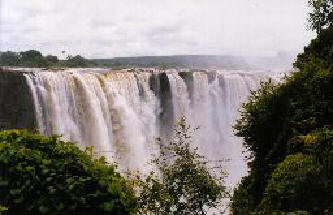
Victoria Falls
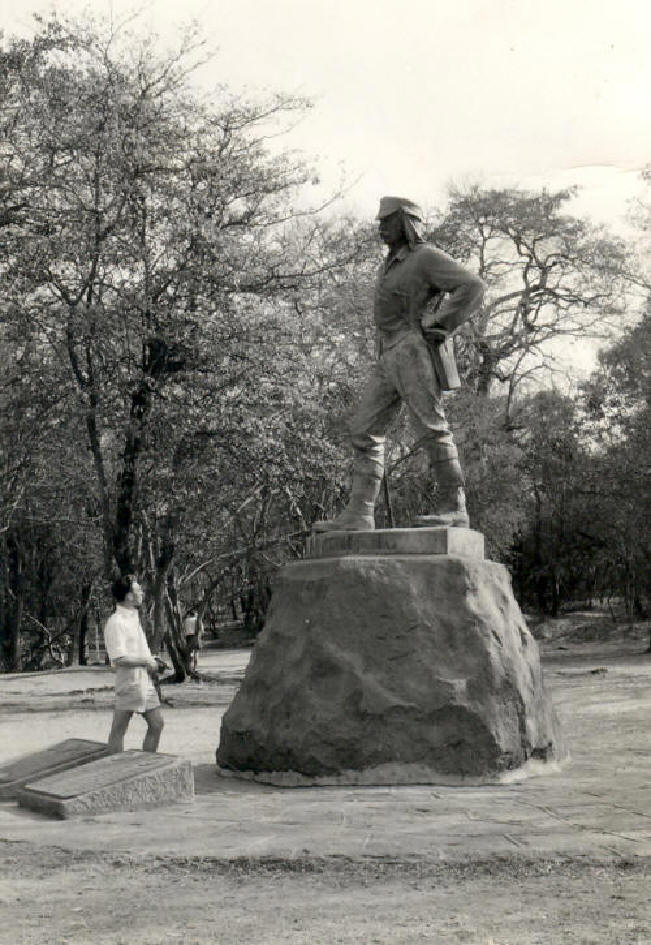
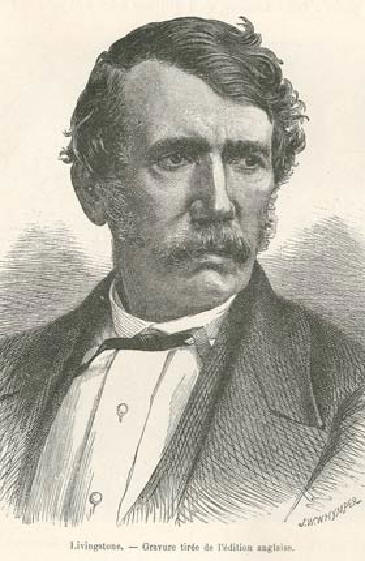
Admiring the statue of David Livingstone
beside the Falls, 1962. Above : David Livingstone, the Scots
missionary and explorer
|
David
Livingstone and the Gwembe Valley
The Scottish
missionary–explorer trekked around the south, east, and
centre-east of Africa for over thirty years in the middle of the
nineteenth century. His journeys extended from the regions of
the modern states of South Africa to Zambia, to Tanzania and
Uganda. I arrived in the Zambesi valley just over a hundred
years after he had visited the Kariba gorge, (in 1860, after
discovering and naming the Victoria Falls in 1855). When
Livingstone met Tonga tribesmen, he described them as “very
degraded”, and from his Victorian and Scots Calvinistic
background, was particularly disturbed by their near-nakedness.
Even their kindness and friendliness were strange to him. “They
always brought presents of maize and mazuka. Their mode of
salutation is quite singular. They throw themselves on their
backs on the ground, and, rolling from side to side, slap the
outside of their thighs as expressions of thankfulness and
welcome .. This … was to me very disagreeable.”
Despite his Victorian and
Scottish Presbyterian hang-ups, Livingstone came to love the
people, and sought to free from the raids of Arab slave
traders. He spent some time at the main village of Chief Mwemba,
50 miles to the south of the Falls. Jobo Michello, the
politician, a descendant of the Chief’s, told me a story from
that period that does not appear in any published records. When
the missionary came to leave the village and move on north, he
called the Chief and his headmen together. Livingstone held out
a cob of corn in one hand, and some bullets in the other, and
asked the Chief which he wanted for his people. Chief Mwemba
chose the cob of maize corn. Livingstone told him he had well
chosen, but informed him that other white men would follow in
years to come, and some of them would bring bullets. “When they
come, - give them this letter”, said Livingstone, handing him a
hand-written letter in an oilskin pouch.
Michello said that the
Chief and his family kept the letter for years, till it was
suggested that perhaps it contained some black magic, so then it
was buried in an anthill just outside the village. “My
grandmother knew where it was buried”, said Michello, “but, no
matter how often I pressed her, - she would never reveal the
location to me. I often wondered what was written in that
letter.” |
Travelling around the
country was a pleasant experience for a colonial employee. The
administration had its strict codes which were designed to maintain
standards and to ensure smooth operations. There were guest houses at
most locations, or if not, you stayed in the guest room of a local
officer. There was a strict protocol on behaviour. You had to dress for
dinner. You had to tip the domestic staff, and to write a letter of
thanks to the host and hostess. And when making the travel claim, there
was an obligatory amount to be sent to the hosts for the hospitality
provided. The PA or Provincial Administration kept a careful eye on the
public and social behaviour of the expatriate officers. Any officer
posted to a remote field station who was suspected of lowered standards
or “going bush” and adopting a rough lifestyle, was quickly recalled to
the central office or station for a dose of exposure to civilized
conduct.
The Kariba valley was
not beautiful, though the lake could be pleasant when the weather was
clear and calm. The high plateau was much more impressive. What
sunsets and sunrises ! There is nothing to compare with the freshness
of an early morning on the east-central African plateau, or the evening
chorus of gnats and grasshoppers as a deep red sun sinks over the
horizon. The month of October was extremely hot and dusty in the
Zambesi valley. It was a bit like India before the monsoon, only less
humid. The fine dust hung in the air and penetrated one’s clothes, eyes,
nostrils and lungs, often carrying an assortment of infections. Then the
rains came in November, and for the next three months or longer, there
was one heavy shower after another. The bush seemed to blossom and
flower and become verdant overnight. Catfish emerged miraculously from
almost dried-up muddy holes, and made their way across land to the
rivers and streams. There were no bridges in the local rivers which
were dry for half the year, only concrete drive-throughs. During the
heavy rains the rivers became raging torrents, and driving through the
fast flowing water could be exciting.
A water engineer from
Bo’ness in Scotland, John Brooks, was driving a truck up the valley to
pay his large team of labourers. With him in the cab was John
Arnold-Edwards, newly arrived assistant to the District Officer. They
came to a swollen river. “Ach”, said John Brooks in his broad
Scots accent, “I’m afraid it is just too deep to cross”. “Not really
John”, said Arnold-Edwards, “Let’s have a go”. Against his
better judgement the older man drove on. The water caught the truck
half-way across, lifted it up, and swept it down-stream and into the
bank. The money-box was washed out of the lorry, and the last they saw
of it’s contents was hundreds of pound notes and ten shilling notes,
floating down the stream. Some astonished fisherman got an unexpected
windfall that day!
John’s younger brother
Joe McGregor Brooks, was a game and tsetse control officer based near
our centre. He was married to a Thai wife, Sena, and they had two young
sons. Joe was a colourful character who had a little kingdom of his own
there. He was one of the few Europeans I met who was fluent in the
Chitonga language. His station was well equipped and he had both fruit
and flowers in the garden. He even had a work-boat motor yacht for
visiting places inaccessible by road. There is a book about Joe’s early
life and work in Northern Rhodesia, “Elephant Valley”, written by
Elizabeth Balneaves, which I was able to obtain before leaving Scotland.
(Balneaves, from Shetland, lived into her nineties and died in 2006, in
Elgin near my home). When my father saw the pictures of Joe, living a
rough frontier life, and standing over elephants he had shot, his hairy
chest exposed, he said with his typical dry tongue-in-cheek Scots humour,
“David, I think that Joe Brooks would be a member of the exclusive
brethren”. Surprisingly, when I later came to know him, I
discovered that Joe had indeed been brought up in that strict sectarian
group!
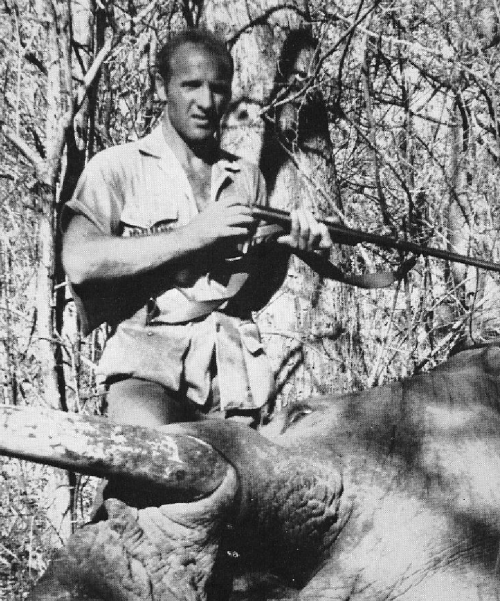
Joe McGregor Brooks with a rogue bull
elephant he had just shot.
Talking of religion,
the staff at our centre represented a number of denominations. There
were Methodists, Anglicans, Catholics, Church of Christ and Jehovah
Witness members. Methodist missions predominated in the valley, and an
English Methodist missionary was stationed nearby. A lovely elderly
Irish Jesuit priest came down about once a month to say mass with the
Catholic members of the staff. He was a typical Jesuit, - serious,
well-read, and observant. I provided lunch for him on his monthly
visits, and enjoyed our conversations on the country, on its people, on
the politics, and on theology.
The colonial government
had a series of local district stations or outposts throughout the
country. These “Boma’s” housed the office of the District Officer and
his assistant if he had one. Their staff would include a number of
local policemen or boma guards who wore fez type hats. Colonial law was
concerned chiefly with serious criminal or political offences and left
all small issues to be dealt with by local chiefs under native law. The
old chiefs received a small stipend for their services. They dealt with
cases of theft, bride abduction or non-payment of lobola or
“bride-price”, and other lesser crimes like common assault. The chiefs
performed largely like wise magistrates. They needed to possess good
local understanding and wisdom to determine cases as Africans take
forever and relate all kinds of extraneous information before getting to
the point of their case. At times the chiefs displayed a wry sense of
humour. Tommy Thompson’s cook “Cement”, was up before our chief one day
on a charge of non-repayment of a borrowed sum of ten pounds. Chief
Sinazongwe found him guilty and fined him fifteen pounds. Cement started
to shout with anger, and protested at length that this was most unjust
as he had borrowed only ten pounds. He demanded that the fine be
changed. “All right, all right”, said the chief after the accused
had been quieted down, “I will change the sentence”. Turning to
the court clerk he said, “Fine him, - twenty pounds” !
During my first year in
the country, we were joined by two fine young officers who were to
become lifelong friends. Brian Mutton was a marine mechanic who did an
excellent job training fishermen to operate outboard motors, and
organizing their maintenance and repair. Sandy MacDonald was an
assistant district officer who had been a navigating officer during
brief naval service. Brian had also served in a branch of the navy, on
Fleet Air Arm patrol vessels. During his period in Zambia, Sandy built
a lovely 23 foot yacht based on a design of one that sailed across the
Atlantic. Brian was a skilled photographer and a fan of jazz music.
Both men went on to work in marine development projects in other parts
of the world. Brian has now retired in Queensland, Australia, and Sandy
runs a farm estate and boatyard on the most westerly point of the
Scottish mainland.
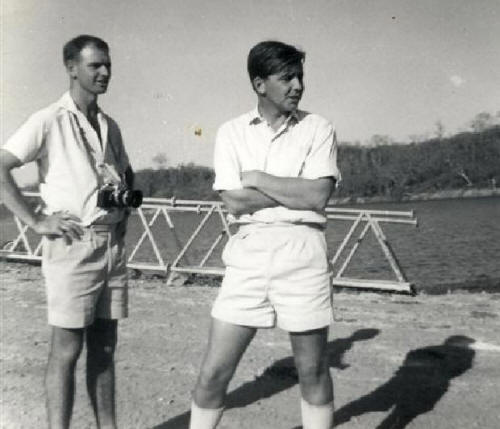
Two good friends and
colleagues of Zambesi days: Brian Mutton and Sandy MacDonald.
Zambia was then
preparing for self-government and independence. The Federation of
Rhodesia and Nyasaland was still in place when I arrived in Africa, but
it was doomed to disappear as each of the countries sought an
independent future. Cold war politicians saw the Federation as a
bulwark against communism, but as it had no grass roots support, that
could never have been effective in the long term. So, Nyasaland became
Malawi, Northern Rhodesia became Zambia, and Southern Rhodesia
eventually got recognition as the independent state of Zimbabwe. But
more of it later.
I was co-opted by the
Provincial Administration to assist with voter registration in the
Gwembe valley, and was sent to a poor remote village a sixty mile
journey from our station on very rough roads. Over a one-week period I
registered 1500 voters. That may not seem like much, but this was the
first time there was universal suffrage for all persons over 21 years of
age. Nobody in the village possessed a birth certificate, and few could
recall with accuracy the date of their birth. Only two dozen persons
could sign their names, all others simply made a thumb mark on the
papers. Some candidates looked far too young to me, and I would discuss
their ages through an interpreter, with the local chief. One young lady
I was reluctant to register, went outside and brought in her three
children. I gave in. “All right, my dear, - you may not be 21, but
you have earned the right to a vote”! One crazy fellow
arrived brandishing a spear, and performing a war dance in front of my
hut. As diplomatically as possible, I told him through the interpreter
that as he was insane, he could not be permitted a vote. He glared at
me for a minute, then threw his head back and laughed raucously, falling
down to the ground and shouting that he did not care if he did not get
the vote, since the District Commissioner had declared him exempt from
the annual native tax, because of his insanity. Then he grabbed his
spear and ran off up the hill and out of sight shouting all the way, “no
tax ! no tax ! no tax ! ”.
A strange episode of
bloodshed occurred in 1964 when Kenneth Kaunda’s party hacks tried to
pressure members of a sect to register and vote for the UNIP party.
This was contrary to the beliefs and practices of the group which
eventually turned violent. The sect was an off-shoot from a Church of
Scotland mission, and became known as the Lumpa church. It was led by a
prophetess, Alice Lenshina, who convinced her followers that bullets
would not hurt them if they had faith and shouted the rallying cry, -
“Jericho!”. In the end, scores of Lumpa church followers would die,
and Alice herself was imprisoned. Negotiations to avoid bloodshed were
led by District Commissioner John Hannah who I knew well as he
previously had a monitoring role over our Gwembe valley project.
There were two main
political parties which as in most of Africa, were based largely on
tribal support. UNIP, the United National Independence party was led by
Kenneth Kaunda and his more leftist and radical deputy, Simon Kapepwe
who was later to form a party of his own. UNIP was supported mainly by
the northern Bemba tribe. The ANC or African National Congress was led
by Harry Nkumbula whose support lay mostly with the southern Batonga
tribe. Kaunda had been in the ANC before, but broke with Nkumbula to
form his own party. Harry Nkumbula’s deputy was Jobo Michello who was
also to leave Nkumbula to form a third party, the PDP, People’s
Democratic Party. Nkumbula had been a good leader in his day, but like
rather many African politicians, in his later years there was a loss of
integrity and control as he over-indulged in alcohol and womanizing.
The British Colonial
government was making (in my view) an honest attempt to prepare the way
for handing over the reigns of power. This varied from provision of
training, and promotion of indigenous civil servants, to gradual
integration of formerly segregated establishments like government guest
houses. They were actually segregated by rank. You had to be of a
certain status to stay in the upper class government accommodation. But
for all practical purposes, that was also racial segregation. The
transition, when it came, must have been as peaceful as any in the
continent. We went from colonial rule to self government to full
independence, within the three years I was in the country, with hardly a
hiccup in how things were run. Few civil servants were dismissed, and
many Brits continued to work in the country for many years. Admittedly
some were appalled to be working under a ‘black’ government, and
magnified each little failure or immature word of the new
administration. Over in Southern Rhodesia, Roy Welensky, bereft of his
Central African Federation, blustered and bellowed, and threatened to
seek power again till Ian Smith became Prime Minister, and went on the
declare independence unilaterally. That was in the year after I left
Zambia.
Four parties contested
the self-government elections in Northern Rhodesia, - UNIP, ANC, PDP and
NPP the National Progress Party (which contested the ten seats reserved
for Europeans). PDP, the People’s Democratic Party, was formed by Jobo
Michello, the former ANC deputy. It surprised most pundits by coming a
close second to UNIP in several constituencies. After the
self-government vote, an interim government was formed, led by Kenneth
Kaunda as Prime Minister. Michello was consigned to the political
wilderness, and was sent down the Gwembe Valley to assist me in running
a revolving loans scheme for the Kariba fishermen, that had been set up
through a donation by the City of Nottingham through the Freedom From
Hunger Campaign. I visited the dynamic fund-raiser twice in
Nottingham. Mrs Charlotte Loewenthal was an intelligent highly
motivated lady of Jewish origin. Her husband, a medical doctor, was a
keen student of global politics, and a believer in an eventual world
government. Sadly, Mrs Loewenthal was killed in a car accident two
years after I left Zambia, and a few months before she was to visit
Zambia at the invitation of the Government.
The first day Michello
arrived at the station, I had not long got him accommodated in the house
formerly occupied by the boat-builder who had been moved to Chilanga
near Lusaka. I was then visited by the local leader of the ANC who
asked me what Michello was doing at our station, and how long he would
be staying. It was only then I realized that my new colleague was
Michello the politician. My staff regarded him with some awe.
Later, over occasional
dinners in my house, Jobo reminisced on his life in politics, and told
me things that had my hair stand on end to use that hackneyed phrase.
Till then I knew little about the dirty side of politics, but Michello’s
stories were an education to me. I was to check some of his facts
later, and found them all to be quite correct. He had been active all
his life in the politics of the emerging nations of East and South
Africa, and was on first name terms with most of the black leaders of
that time. He mentioned meetings with senior British and American
government ministers and foreign office personnel. He also described
approaches from other power blocks that his then ANC leader rejected,
but which were readily adopted by Kaunda and Kapepwe. The financing of
political parties by foreign powers, and how that finance was used, was
a revelation to me.
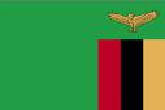
The flag of independent Zambia
Independence came in
1964, and Kenneth Kaunda was duly sworn in as Zambia’s first President.
The occasion was marked with great celebrations all over the country,
and our little community had its own festive events with all the people
dressed in their finery and sporting paper copies of the new national
flag. I think I enjoyed the day as much as the native people did. A
few months later, Kaunda paid an official visit to our centre. I showed
him and his party around, and while he was talking to the staff, one of
his black bodyguards approached me. “Your name is Thomson – right?
You have a brother in the Metropolitan Police – yes? Well, - I did my
training with him in London”. Another of those odd coincidences in
Africa.
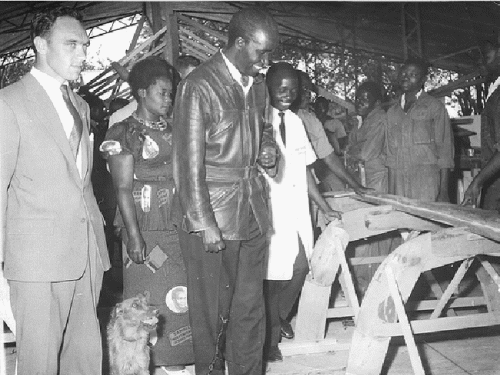
With President Kaunda (and my wee terrier
dog)
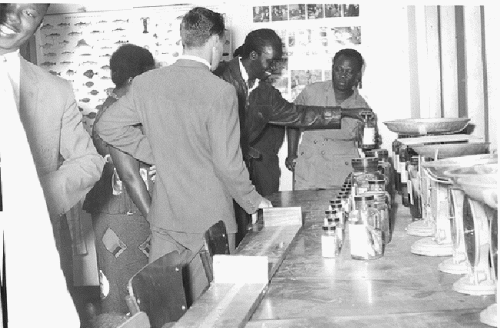
Showing Kenneth Kaunda examples of fish
species from Kariba. The smiling man in the top left corner was one of
the President’s bodyguards who informed me he had trained in London with
my brother James.
The President went off
to an island in the lake for a picnic lunch, accompanied by his
entourage, and by my colleague Michello, and escorted offshore by scores
of powered canoes from our fishing fleet. I went back to the station to
dismiss the staff, still arranged in formation on the parade ground.
stepped out of the Landrover and gave the UNIP vibrating hand wave that
Kaunda had been displaying throughout the visit. The staff (mostly
Tonga) sheepishly returned the wave. Then as I dismissed them and
turned to go away, I gave the ANC two thumbs wave over my head,
signifying - “one man, - one vote”. The tension broke and the
whole assembled body burst into laughter. Africans liked it when you
saw the funny side of things, or appreciated their mixed feelings or
embarrassment.
My experience of life
in Zambia during the tail end of the colonial regime, through the brief
transitional self-government period, and on into full independence, was
a thoroughly pleasant one. I cannot say that any part of it was
difficult or unhappy. The local Africans treated me with respect
regardless of the government. I was once asked by the local ANC
representative to join that party, but this was done in a half-hearted
way, and when I pointed out that as a foreign citizen, I could not vote
in Zambia’s elections, he accepted my position without complaint. But
one post-independence incident might serve to illustrate the general
atmosphere of that time:
There was a man in the
neighbourhood who had a vendetta with one of my staff (the cause of
which was unknown to me – and in Africa, foreigners are well advised to
stay out of such feuds). But he caused a disturbance once too often, so
I took him to the local Boma office and told the guards that I did not
want to see him again near our compound. As far as I know, they put him
on a truck to the plateau. At that time I was about to start training
scores of applicants for government jobs, - in my case for fish guard
positions, - a kind of low level fishery department worker, who wore a
uniform rather like a boy scout. The first truck load of trainees
arrived in a few weeks, and I assembled them for an initial briefing,
and to explain the rules of their stay as far as dormitory, food and
training went.
There, in the midst of
the crowd of trainees, one rather guilty face stood out. It was the
troublesome fellow I had removed from the area. Later that day I got an
eloquent letter (as only Africans can write them), to say that fate had
been so cruel to him all his life, and now, when he finally had the
chance of a permanent job, he had been placed in the hands of the one
person who had reason to think ill of him. I called him to my office,
and puting on a stern face, told him that what happened before was in
the past. He would be judged on his merits in the course. If he passed,
he passed. If he failed, he failed. But I would not hold his earlier
behaviour against him provided it was not repeated. Well, from that
moment on, he became a star pupil, and gave me no trouble whatsoever.
Perhaps rather
unfairly, the government sent me trainees in batches of 50, for whom
there were only about 40 jobs at the most. So the bottom ten were
destined to be rejected, and this fact was not lost on the whole group.
The training programme was quite basic. After being issued with a
simple uniform, the candidates spent the first two weeks in labouring
work, to assess their fitness and their willingness to undertake any
duties, which was really what a fish guard had to do. That was followed
by a week of square bashing with lots of marching and saluting, and
regimentation. Only in weeks four to six did they get to learn boat
handling, engine maintenance, net repair, and fish identification. My
senior fish guard examined them at all stages and presented me with the
results at the end of the course, - so I had no part in the final
selection other than to endorse his findings.
The class referred to
above contained some surly characters from the copperbelt who I suspect
were chosen for their political loyalties rather than their potential as
civil servants. They rebelled at having to do labouring work, and I
guess, surmised that their chances of failing the course were quite high
since the other candidates were much more enthusiastic. Anyhow, they
walked out of the course and off to the capital. I would not have known
what action they then took, except that my friend Jobo Michello happened
to visit the Minister of Natural Resources at that time. Also, I had
sent a truck to Lusaka to collect timber for boat buiding and cement for
making bricks, and had allocated two of the labouring trainees to go
with the driver to help load and guard the vehicle. One of them, I
believe the character who had caused me trouble before, had gone off to
relieve himself before the truck left the city, but it departed while he
was away, and he found himself without transport, and facing a possible
charge of dereliction of duty. In desperation he went to appeal for
help at the Ministry offices.
Apparently the
disgruntled group had asked to see the Minister, and proceeded to
complain that they were being treated like labourers by a white
foreigner, instead of being assured of a government job. The Minister
asked Michello who happened to be around if the complaints against
Thomson were justified. He replied that there was nothing demeaning in
the course, but that those fellows were really not willing to work.
Just then the trainee who had missed his place on the lorry, arrived to
ask for help to return to the Sinazongwe centre to continue his course.
The Minister called him in and demanded to know if the conditions were
bad, and if Thomson was mistreating them. The trainee assured him that
all was well, he had no complaints, but he desperately did not want to
lose his place on the course. The Minister directed his staff to
arrange for the man’s transport, then turned to the striking group and
ordered them out, telling them that they were just downright lazy! As I
indicated above, I would have known nothing about the incident had
Michello not been present, and recounted it to me later.
I departed Zambia in
August 1965, never to return, although I was to visit over a dozen more
African States. Zambia was one of the last of the former British
colonies in Africa to obtain independence. All over the continent,
MacMillan’s “wind of change” was blowing, and it was bringing as much
fear as hope in its wake. Sadly the experience of many of these newly
independent nations has been tragic to say the least. All the cold war
rhetoric about the evils of colonialism has evaporated as those
countries have suffered worse mis-rule, injustice, and greater
exploitation under their own home-grown governments. |

